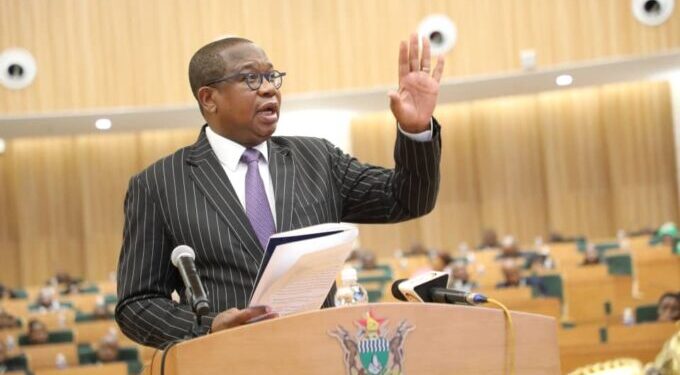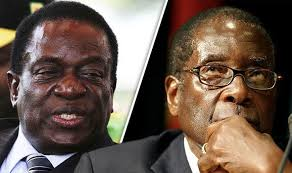THE piecemeal removal of sanctions imposed on Zimbabwe by the United States has been described as a step in the right direction, although the country prefers to have the illegal embargo completely removed.
In an interview with The Herald yesterday after the closing media conference at the 56th UNECA Conference of Ministers of Finance, Planning and Economic Development, Finance, Economic Development and Investment Promotion Minister Professor Mthuli Ncube said he was hopeful that in future, all the sanctions would be removed to allow the country to chart its developmental trajectory unhindered.
“It is a step in the direction; remember we have been in an impasse for quite a while and (when) we see this move now; I think it’s a step in the right direction.
“Of course, we would have wanted to see more, but this is what we have now and hopefully, the next time around we can move to the next level,” said Prof Ncube.
He added that the partial removal of sanctions could open a window for Zimbabwe to engage the international community further for Harare to “have access to resources for its economic agenda”.
During the course of yesterday, a number of experts from across Africa told journalists during media briefings that the partial removal of sanctions was welcome, but stressed that it would be great if all the sanctions, in whatever form, were to be removed.
Asked about the latest move by the US on Zimbabwe sanctions, UNECA director – Subregional office for Southern Africa Centre of Excellence for Inclusive Industrialisation, Ms Eunice Kamwendo, said: “It’s a difficult question, but all I can say is that it is good news and I think a lot of other countries that have part sanctions from the US and others are looking towards the same.”
Kenya’s Cabinet Secretary in the National Treasury and Economic Planning, Prof Njuguna Ndung’u also said the move was a step in the right direction, adding that no country deserves sanctions as they exclude it from accessing cheaper sources of finance.
“You have talked about sanctions, especially sanctions on finance; finance is our bread, without finance most things cannot work.
“I am not familiar with the subject matter because I was in the meetings and I didn’t know about the lifting of sanctions, but the most important thing is that it is welcome and we believe that without finance, we are inhibited,” said Prof Ndung’u.
Permanent representative of Uganda to the African Union and UNECA, representing the chair of the outgoing Bureau, Ambassador oRebecca Amuge Oteng, castigated the imposition of sanctions on other countries.
“Uganda would like to express concern regarding the unilateral and other sanctions imposed on the member States and international organisations,” she said during the official opening ceremony on Monday.
Industrialist Mr Busisa Moyo posted on X that the partial removal of sanctions was “huge”.
On Monday, US President Joe Biden said he found that the “declaration of a national emergency in Executive Order 13288 of March 6, 2003, with respect to the actions and policies of certain members of the Government of Zimbabwe and other persons to undermine Zimbabwe’s democratic processes or institutions, as relied upon for additional steps taken in Executive Order 13391 of November 22, 2005, and as expanded by Executive Order 13469 of July 25, 2008, should no longer be in effect”.
However, Washington still retains the illegal sanctions through the Zimbabwe Democracy and Economic Recovery Act of 2001 (Zidera).
The sanctions, which violate Article 41 of the United Nations Charter, still exist not only in the form of Zidera, but also in the Global Magnitsky programme where 11 individuals including President Mnangagwa and other top Government officials have been placed.
The three Executive orders that have been removed are; order 13288 Blocking Property of Persons Undermining Democratic Processes or Institutions in Zimbabwe (Effective Date – March 7, 2003), order 13391 Blocking Property of Additional Persons Undermining Democratic Processes or Institutions in Zimbabwe (Effective Date – November 23, 2005) and order 13469 Blocking Property of Additional Persons Undermining Democratic Processes or Institutions in Zimbabwe (July 25, 2008).
As a result, the economic sanctions administered by the US Department of the Treasury’s Office of Foreign Assets Control (OFAC) programme are no longer in effect.
Some of the other people who remain on the Global Magnitsky programme are First Lady Dr Auxillia Mnangagwa, Vice President Dr Constantino Chiwenga, Minister of Defence Oppah Muchinguri Kashiri, ZRP Commissioner-General Godwin Matanga, Deputy Commissioner-General Stephen Mutamba, Deputy Director General – Central Intelligence Organisation Walter Tapfumaneyi, Midlands Minister of Provincial Affairs and Devolution, Owen Ncube, businessman Mr Kudakwashe Tagwirei, Ms Sandra Mupunga and Fossil Group CEO Mr Obey Chimuka.
Three companies on the list include Sakunda Holdings, Fossil Agro and Fossil Contracting.
The US and its Western allies imposed sanctions on Zimbabwe at the turn of the millennium as a revenge for embarking on the Land Reform Programme.
SOURCE : BULAWAYO24










